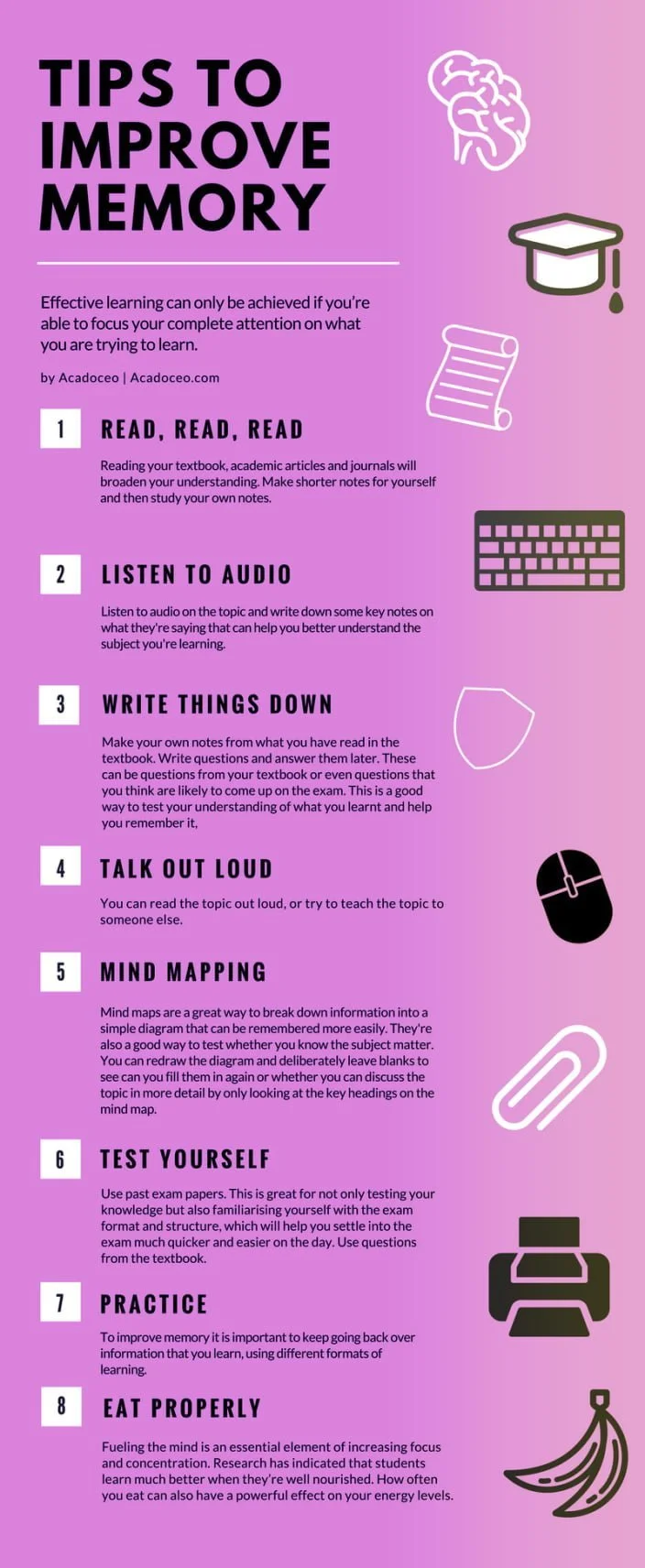
Do not find car keys, you left your lunch at home, forgot to congratulate your best friend on birthday, it’s hard to remember the names of people in a new company?
All these and other unpleasant changes that are associated with memory cause dissatisfaction and bring chaos to life.
So it’s time to focus on memory related factors and get practical tips to keep your sharp minds.
Do not believe in myths that deterioration is aging!
Only those middle-aged and older people are less likely to remember the new things that are affected by negative stereotypes about the effect of aging on memory.
If you think you are not controlling your memory function, you will be less likely to maintain or improve it, and you may experience a decline in cognition.
However, if you believe that you can improve, and apply this faith in practice, you have better opportunities to keep your sharp mind and enjoy the old age.
Articles you might like:
What Does Your Favorite Color Say About You? 11 Main Colors [Poster]
Your Daily Habits and Toxic Brain
Tips How to Improve Your Brain Memory

»Click Here To download Printable “Improve your memoty” Poster [PDF]«
- Learn the Habit of Learning
Higher education is directly related to more active brain activity in the old age. According to the expert, when a person develops a habit of being mentally active, one can maintain a good memory.
Learn the languages, improve your already well-known, follow your hobbies in the courses. Work volunteers for projects that require skills that you do not normally use. Creating and maintaining links between brain cells is a continuous process, and therefore, you prefer lifelong learning. Here are some tips how to improve your memory:
2. Be Mentally Active
The brain has a positive effect not only on the learning of vocational subjects, but also on hobby or learning new skills.
In the evenings at home, discover activities that are useful for a variety of brain activities that include you: read books, it may also be the audio language of a foreign language you want to educate; solve crossword puzzles Sudoku; play chess; Launch puzzles; write your life story; make a tree of the family; subscribe to your favorite publications; Design a new garden layout and so on. t
Physical exercise improves oxygen supply to the brain and reduces the risk of diseases associated with serious memory problems. Physical exercise strengthens the beneficial effects of brain chemicals and helps to better absorb the food intake needed for the brain.
4. Maintain the work and home environment
Hold the wallet, keys, handbag only in their designated place. Reconfigure your home environment and your home. There is a great deal of application: the closest to you (in cabinets, drawers), the most likely products and tools for frequent use should be available.
Get rid of old documents and magazines in the workplace. Get used to the last day of the month to spend 30 minutes. workstation, computer order. The process will help you focus on new information you want to keep in mind.
Failure to get enough fluid in the body and mind will get tired more quickly. Water activates the activity of red blood cells, which makes it more energetic.
6. Sleep Well
Optimal sleep duration protects the brain from aging processes. British researchers have found that sleeping for longer than 8 hours and less than 6 hours is associated with brain aging and functional impairment. The study involved 5,431 people. Ensure that there are no distracting objects in the bedroom, as well as a TV. Sleep well in well ventilated areas. Come and go at the same time.
Best food for brain

»Click Here To download Printable Brain Foods Poster [PDF]«
Brain cells that are responsible for memory require a variety of materials:
Fatty acids
Unsaturated fatty acids make up one third of the brain. In the absence of them, brain cell activity is deteriorating and may even erase memories. These acids improve the circulation of the blood, resulting in more nutrients entering the cells. The suppliers of “good fat” – fish oil and some vegetable oils: sunflower, soya, rapeseed, olives, as well as nuts, sunflowers.
Carbohydrates – Glucose Source, Neuron Fuels.
The complex or lean carbohydrates are derived from cereals, bread (just no sweets and flakes, but whole grains of bread or bread with bran), noodles of hard wheat and vegetables. In the intestines, they split up a long time, and in the end they also get glucose.
It slowly, within 1-4 hours. gets into the bloodstream and gradually provides the body with energy. In this way, the heavy hydrocarbon “burned” is practically non-greasy. This food provides mental and physical strength for a long time. It is more beneficial than ordinary cigarettes: sugar, sweets, white flour products that quickly deliver short-term energy.
Excessive carbohydrates are even more cumbersome because they use the B group of vitamins which are essential for the brain.
Proteins
They contain amino acids necessary for the nerves and the brain. Animal protein sources include meat, fish, seafood, chicken, eggs, milk and its products.
Vitamins
B vitamins are brain and nervous system enhancers. They play a key role in the memory process and need it everyday. Rye bread, rice, whole grains – a great source for them.
Vitamin E (a lot of it contains olive oil, avocados, nuts) is a necessary nutrient of the brain cells, along with vitamin A (liver, butter, eggs) protects neurons from the negative effects of free radicals. These vitamins are believed to slow down memory loss in Alzheimer’s.
Minerals
Magnesium is vital for the transfer of nerve impulses and muscle contraction. No less significant iron, potassium, calcium and zinc. The latter element is particularly important as it participates in many metabolic processes.
So, in the brain, he has important functions, such as the transmission of signals between nerve cells. Therefore, those who are prone to forgetfulness are advised to eat dried apricots, raisins, nuts, fried potatoes and apples, yogurt, dairy products. Magnesium sources include meat, vegetables, nuts, milk and dairy products.
Continuos Communication
Go to the guests, chat with your friends, arrange logical games, tours. Even though it’s fun to communicate, be sure to follow the plans and the regime. Schedule how much time you can spend on communication, and stick to that plan. You will be more inclined to plan your time more efficiently.
Few more ways to improve your brain memory
Mnemonics It’s a creative way to keep track of your lists. Mnemonics may be abbreviations, such as the English abbreviation RICE, which helps you remember first-hand tips for injury in the extremities: Rest, Ice, Compression, and Elevation.
Make the most of your senses. The more sensations you use when learning, the more the brain enters the memory of newly learned things.
In one study adults showed emotionally neutral images, each presented with a certain smell. The participants in the study were not asked to memorize them. Later, they were shown pictures – this time without odors – and asked to indicate which of them they had seen before. The participants in the study perfectly remembered the pictures that were accompanied by scents, especially those that were pleasant to them.
Diagnostic brain imaging has shown that pear bark – the main brain area – “responsible” for scents – has intensified people’s observation of scent-paired images, although odors have disappeared and the participants in the study did not try to remember them.
So challenge your brains trying to get to know unfamiliar things. For example, when pouring and drinking a new dish in a restaurant, try to guess its components. Try to sculpt sculptures or pottery to try and smell the materials you use.
Know what you want to learn
Do it at the right time. Repetition is the most powerful learning weapon if it is used in a timely manner. Repeat something a lot of times for a short time, as if you were learning for the exam – not the best way.
It is better to repeat the basics after a long period of time – once per hour, then – once in a few hours, and then – once in a few days. Increasing learning periods is especially valuable when you try to memorize complex information, such as the details of a new job assignment.
The study shows that such repetitions with a prolonged period among them improve the ability to remember not only healthy people but also those who have physically based cognitive problems, such as those with multiple sclerosis.






